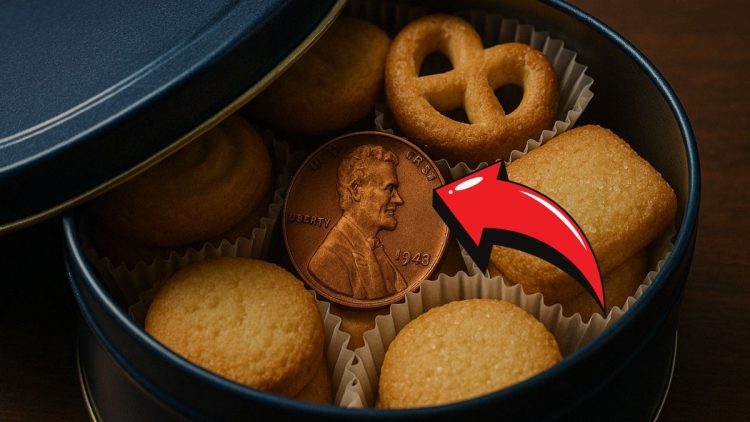In an astonishing turn of events, a seemingly ordinary 1943 copper penny discovered in a vintage cookie tin has sold for an impressive $250,000 at auction.
This remarkable find has captivated coin collectors and enthusiasts alike, highlighting the immense value that rare coins can hold.
The Accidental Creation of the 1943 Copper Penny
During World War II, the U.S. Mint faced a shortage of copper, a critical material needed for wartime production. To conserve copper, the Mint produced pennies using zinc-coated steel in 1943.
However, due to a minting error, a small number of copper planchets (blanks) from 1942 were inadvertently used, resulting in the creation of a limited batch of 1943 copper pennies.
Discovery in a Cookie Tin
In early 2025, a retired teacher stumbled upon a 1943 copper penny while sorting through his late father’s belongings.
The coin was found in a cookie tin filled with old keys, coins, and memorabilia. Recognizing its unusual appearance, the finder conducted a magnet test—since steel pennies are magnetic and copper ones are not—and confirmed the coin’s non-magnetic nature.
Further authentication by a coin expert verified its authenticity, leading to its sale at auction for $247,500.
Key Characteristics of the 1943 Copper Penny
To help identify a genuine 1943 copper penny, consider the following attributes:
| Feature | Description |
|---|---|
| Year | 1943 |
| Composition | 95% Copper, 5% Tin and Zinc |
| Weight | 3.11 grams |
| Magnet Test | Non-magnetic |
| Color | Reddish-brown hue |
| Known Examples | Fewer than 20 |
| Estimated Value | $200,000 – $1,000,000+ |
Why Is the 1943 Copper Penny So Valuable?
Several factors contribute to the high value of the 1943 copper penny:
- Rarity: With fewer than 20 known examples, it’s one of the rarest U.S. coins.
- Historical Significance: Represents a unique error during a pivotal time in history.
- Collector Demand: High interest among numismatists drives up auction prices.
- Condition: Well-preserved specimens command higher values.
How to Identify a 1943 Copper Penny
If you suspect you have a 1943 copper penny, follow these steps:
- Check the Date: Ensure the coin is dated 1943.
- Magnet Test: Use a magnet; if the coin sticks, it’s steel. If not, it could be copper.
- Weigh the Coin: A genuine copper penny weighs 3.11 grams.
- Consult an Expert: Have the coin authenticated by a reputable coin grading service.
The discovery and subsequent sale of a 1943 copper penny for $250,000 serves as a compelling reminder of the hidden treasures that may reside in our homes.
Whether tucked away in a cookie tin or nestled among spare change, rare coins like this one underscore the importance of examining our possessions carefully.
For collectors and casual enthusiasts alike, the allure of uncovering such a valuable piece of history remains ever enticing.
FAQs
How many 1943 copper pennies are known to exist?
Fewer than 20 authentic 1943 copper pennies are known to exist, making them extremely rare and valuable.
Why were some 1943 pennies made of copper instead of steel?
Due to a minting error, leftover copper planchets from 1942 were accidentally used in 1943, resulting in a small number of copper pennies being produced.
How can I determine if my 1943 penny is made of copper?
Perform a magnet test; copper pennies are non-magnetic. Additionally, weigh the coin—copper pennies weigh 3.11 grams.
Where can I get my 1943 penny authenticated?
You can have your coin authenticated by reputable coin grading services such as PCGS, NGC, or CAC.

